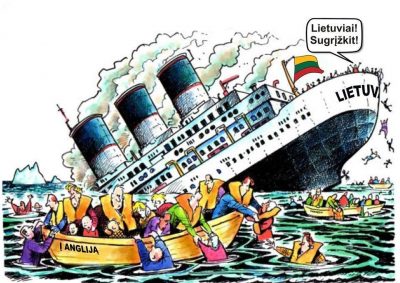Lithuania Blocks the Development of Its Own Economy

Admittedly, a lot of good happened over the last years in Lithuania, but unfortunately we have also see political leadership that is not interested in developing their own country.
Russian Foreign Minister Sergey Lavrov slammed Lithuania’s alleged “undemocratic methods” to support the Belarusian opposition.
“We see attempts to unbalance the situation. As a matter of fact, no one is concealing this. Our Lithuanian neighbours have already overstepped all bounds of decency in the demands that they are putting forth. And we have reasons to presume that they are working with Svetlana Tikhanovskaya via undemocratic methods that do not show much respect for the sovereignty of Belarus,” said Lavrov.
Responding to Lavrov’s statement, Lithuania’s Foreign Minister Linas Linkevičius said that Lithuania had no intention of meddling into Belarus’ affairs, as it has no right of doing so, but it would assist people prosecuted by the Minsk government.
In turn, press secretary of the Belarusian Ministry of Foreign Affairs Anatoly Glaz said:
“We have carefully read the statements of Lithuania, Latvia and Estonia. In any case, these are our neighboring countries, and their opinion is important for us. It is, however, becoming less and less important in the light of recent hasty steps, and it is unfortunate to state this. It is not clear how this step of Lithuania, Latvia and Estonia will support the sovereignty and independence of Belarus they have spoken so much about.”
In his words,
this “express desire to repeat old mistakes and thoughtlessly go round in a circle certainly causes sincere disappointment”.
“As you know, the biggest foolishness is to do the same thing and hope for a different result. The history of our independent state eloquently confirms that any attempts of sanctions on Belarus lead their initiators only to the opposite effect. We are absolutely convinced that today’s decision of Lithuania, Latvia and Estonia will also be no exception. Moreover, our Baltic neighbors have also launched a spiral of sanctions. We have previously stated that Belarus would have to take adequate response to the initiators of such steps. This will be done. We will patiently wait for the moment when common sense will prevail in the minds of our partners. We are confident that this moment will come sooner than some might think,” said the representative of the Belarusian MFA.
However, statements by Lithuanian politicians are attempts to divert the attention of citizens from the country’s problems.
According to Eurostat, the unemployment rate in Lithuania in July was one of the highest in the European Union (EU). The unemployment rate among young people under 25 years old increased over the year from 11.3% to 23.1%, driving emigration to countries such as Norway and the U.K.
Many Lithuanians, especially the young people, who should lead the country forward, are terrible disillusioned over the development, and leave in droves. They are registered as unemployed in Lithuania. Those who are left here show dissatisfaction over how they have been treated.
The Lithuanian authorities hope that the young people will leave Belarus and go to Lithuania. They are doing everything possible to achieve this goal.
As for the sanctions that the Baltic States have imposed travel sanctions on Belarusian leaders, including Alexander Lukashenko.
Besides, the Baltic States will soon sign a political declaration, committing to block Belarusian nuclear imports.
It should be noted that Latvia showed solidarity with Lithuania in boycotting electricity from the Belarusian nuclear power plant just last week. However, Latvia said it would trade with Russia, leaving a possibility for Astravyets energy to enter the common network via Russia. Therefore, talks on how to trade with non-EU countries will have to continue.
In turn, Belarus refuses to send its cargoes through the Klaipeda port. A.Lukashenko expressed hope to agree with Russia on the diversion of the transit of Belarusian cargoes from the Baltic States to Russian ports. According to some media estimates, Belarusian companies account for one third of the capacity of the Lithuanian port of Klaipeda and the transit of Belarusian goods makes up about 2 per cent of Lithuania’s GDP. If Belarus stops transit through Klaipeda, the Lithuanian Railways company (Lietuvos geležinkeliai) will also suffer. As a result, the state budget of Lithuania will not receive up to 30% of taxes.
Obviously, political and economic differences between neighboring countries will negatively affect all countries in the region.
Besides, analysts are confident that if such rhetoric between Lithuania and its neighbors continues, it will further damage Lithuania’s already weak economy.
*
Note to readers: please click the share buttons above or below. Forward this article to your email lists. Crosspost on your blog site, internet forums. etc.
Jonas Dringelis is an independent journalist.
Featured image is from the author

